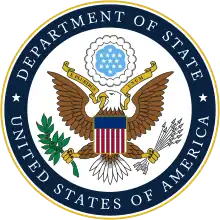Rodney O'Gliasain Kennedy-Minott | |
|---|---|
| United States Ambassador to Sweden | |
| In office September 29, 1977 – September 26, 1980 | |
| President | Jimmy Carter |
| Preceded by | David S. Smith |
| Succeeded by | William Cowles Hamilton |
| Personal details | |
| Born | June 1, 1928 Portland, Oregon, U.S. |
| Died | December 15, 2004 (aged 76) Monterey, California, U.S. |
| Political party | Democratic |
| Alma mater | Stanford University |
| Profession | Professor Historian Advisor |
| Military service | |
| Allegiance | |
| Branch/service | |
| Years of service | 1946–52 |
| Rank | Sergeant |
Rodney O'Gliasain Kennedy-Minott (sometimes spelled Rodney Glisan Kennedy-Minott;[1] June 1, 1928[2] – December 15, 2004)[3] was an American diplomat, Democratic Party activist and professor.
Early life
Rodney Glisan Minott was born to Joseph Albert Minott and wife Gainor Owen Baird, in Portland, Oregon, on June 1, 1928. His great-grandfather was Dr. Rodney Glisan. He served as a United States Army sergeant in Japan from 1946 until 52.[2][4] He then studied at Stanford University, receiving his bachelor's in 1953, master's in 1956, and doctorate in 1960.[2]
Academic career
From 1960 until 1965, Kennedy-Minott was assistant director of the Western civilization history program at Stanford University, before becoming associate professor at Portland State University. In 1966, he became associate dean of instruction at California State University, where he became a full professor of U.S. history in 1969.[2] He was a senior lecturer in national security affairs at the Naval Postgraduate School until his retirement in 2002.[3]
From 1971 until 1973, he advised Thames Television on European emigration to the United States, and served as a researcher for The World at War.[5]
Political career
Kennedy-Minott worked on the 1964 United States Senate campaign of Pierre Salinger and the 1972 presidential campaign of George McGovern.[6]
In 1976, Kennedy-Minott was chairman for the Northern California portion of Jimmy Carter's presidential campaign.[3] In August 1977, Carter appointed him ambassador to Sweden, which he served as until September 1980.[7] Carter was a close friend of Kennedy-Minott, and a frequent guest at his home in Atherton, California.[6]
Personal life
Kennedy-Minott was married to Polly Fitzhugh Kennedy (1929-1997), but they had divorced before her death.[8] They had two daughters (Katherine Pardow and Polly Berry) and a son (Rodney Glisan).[2] Kennedy-Minott had three grandchildren (Cambria Minott-Gaines, William Weihnacht and Joseph Minott). He died from complications of pancreatitis on December 15, 2004.[9]
Published works
- Peerless Patriots: the Organized Veterans and the Spirit of Patriotism (1962)[5]
- The Fortress That Never Was: the Myth of Hitler's Bavarian Stronghold (1964)[5]
- The Sinking of the Lollipop: Shirley Temple vs. Pete McCloskey (1968)[3]
- U.S. Regional Force Application: the Maritime Strategy and its Effect on Nordic Stability (1988, Hoover Institution)[10]
References
- ↑ "Deaths (December 29, 2004)". Palo Alto Online. 29 December 2004. Retrieved 9 October 2019.
- 1 2 3 4 5 Newsletter. American Diplomatic and Consular Service. 1977. p. 14. Retrieved 9 October 2019.
- 1 2 3 4 "R. Kennedy-Minott, 76; Appointed Ambassador to Sweden by Carter". Los Angeles Times. 22 December 2004. Retrieved 9 October 2019.
- ↑ "Hoover Institution Newsletter - Winter 2005" (PDF). Retrieved 11 October 2019.
- 1 2 3 President, United States (1977). Public Papers of the Presidents of the United States. Federal Register Division, National Archives and Records Service, General Services Administration. p. 1356. Retrieved 9 October 2019.
- 1 2 Rubenstein, Steve (21 December 2004). "Professor Rodney Kennedy-Minott". SFGate. Retrieved 9 October 2019.
- ↑ "Rodney O'Gliasain Kennedy-Minott - People - Department History - Office of the Historian". history.state.gov. Retrieved 9 October 2019.
- ↑ "OBITUARY -- Polly Berry Kennedy". SFGate. 8 July 1997. Retrieved 10 October 2019.
- ↑ "Rodney G. Kennedy-Minott obituary". The Washington Post. 25 December 2004. Retrieved 9 October 2019.
- ↑ Kennedy-Minott, Rodney (1988). U.S. regional force application. Hoover Press. ISBN 9780817951634. Retrieved 9 October 2019.
